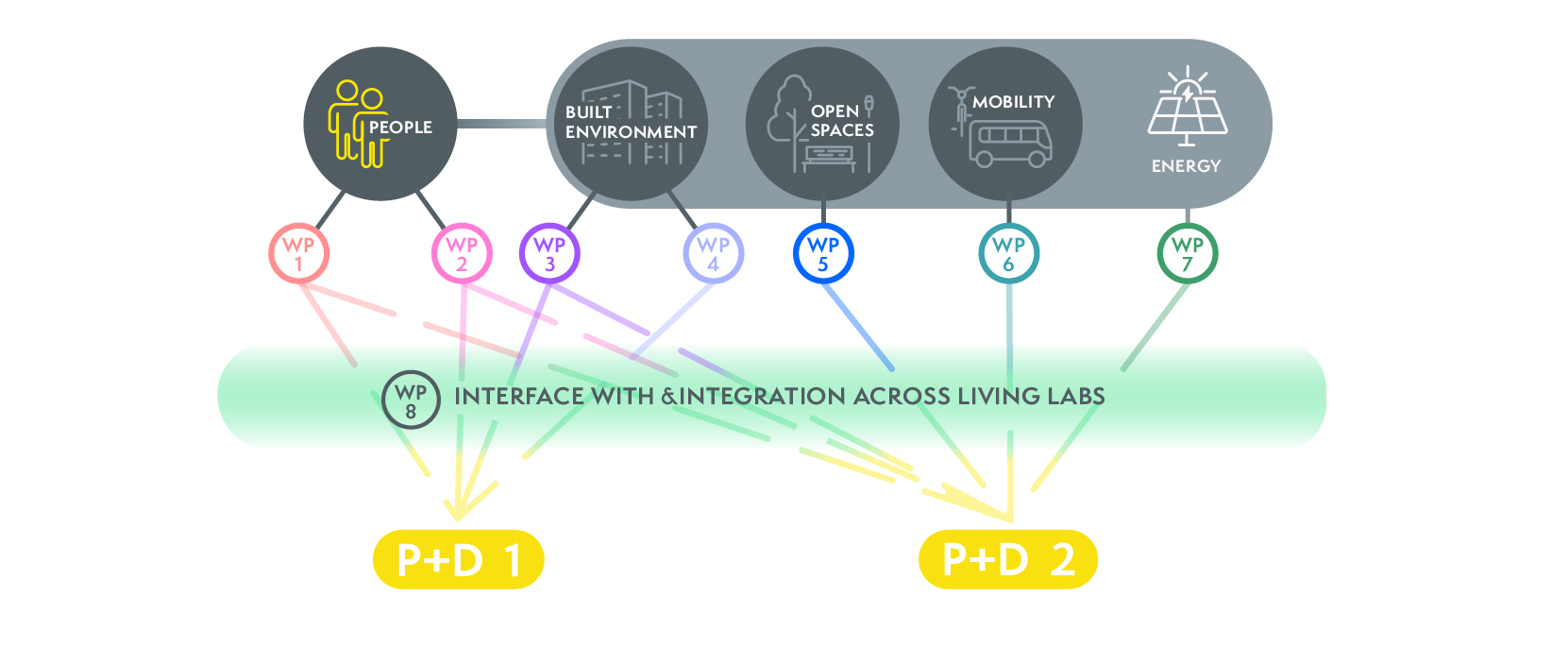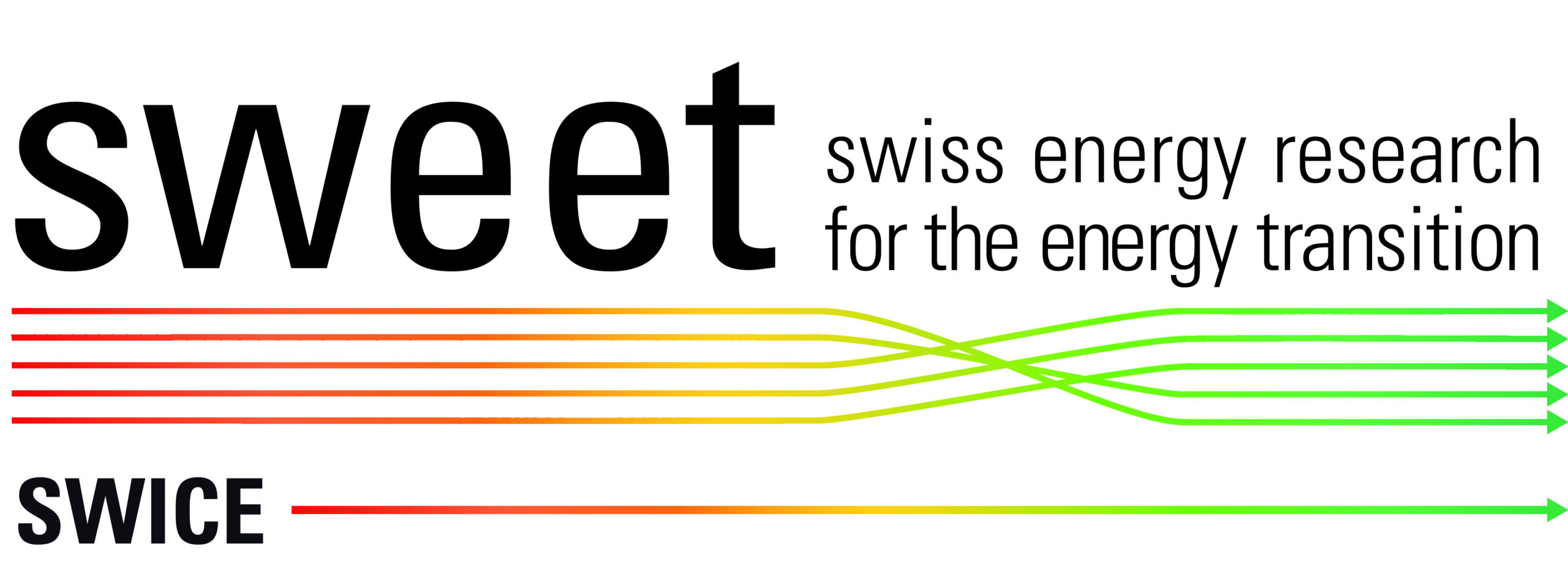Work packages
The unique inter- and trans-disciplinary nature of the SWICE consortium will allow the creation of research synergies on multiple levels so as to tackle the energy transition’s objectives with a holistic approach.
The R&D work packages will enable the development of pilot and demonstration (P+D) projects which will build upon the early findings and methodological developments generated during the project.

WP1. The human dimension of change
WP1 will define a holistic framework for understanding and fostering social and behavioural change. It will explore positive and negative spillover effects across different dimensions and their management, and will include holistic assessments in living labs to test the effectiveness of the interventions.
WP leaders: Julien Nembrini (UNIFR) and Bernadette Suetterlin (ZHAW)
WP2. Wellbeing, standards and transition
WP2 will develop a framework, including new model service provisioning, standards, and transition milestones, to reach individual and collective well-being with a much smaller resource footprint.
WP leaders: Philippe Thalmann (EPFL) and Julia Steinberger (UNIL)
WP3. Resilient transition of neighborhoods
WP3 will develop transformation strategies to make existing neighbourhoods more sustainable with a climate/energy plan as a main output.
WP leaders: Florinel Radu (HEIA FR) and Corentin Fivet (EPFL)
WP4. Towards climate neutral buildings
WP4 will support the transformation of the current building stock to reach climate neutrality by integrating sufficiency measures in the design and operation of buildings while supporting occupant well-being.
WP leaders: Kristina Orehounig (Empa) and Colin Jones (EPFL)
WP5. Open spaces in energy transitions and wellbeing
Starting from the current state of energy usage in open spaces, WP5 will model possible future scenarios and propose tangible interventions through living lab approaches in Geneva and Fribourg.
WP leaders: Séréna Vanbutsele (HEIA FR) and Marlyne Sahakian (UNIGE)
WP6. New work, mobility and energy
WP6 will analyze and implement, through empirical fieldwork, new forms of work (flex time, coworking, home-office), MaaS Site, Gamification (CO2-Feedback) that can have high potential for reducing energy consumption while accounting for their effect on people well-being.
WP leaders: Timo Ohnmacht (HSLU)
WP7. Energy systems and infrastructures
WP7 will develop an energy system adaptation model (digital twin) to represent the possible sustainability and economical impacts of architectural and urban actions on the energy system at different scales. The aim is to be able to calculate the impact of local actions to help decision-making in sustainable living developments and to outline sustainable pathways for the Swiss energy transition.
WP leaders: François Maréchal (EPFL)
WP8. Interface with and integration across Living Labs
In partnership with Living Lab actors, including consortium and implementation partners, WP8 will combine advancements in Living Lab action-research with the co-development of practice-oriented intervention tools. Particular attention will be given to impact assessment, enablers and barriers and upscaling/translation of high-impact Living Labs activities.
WP leaders: Anton Sentic (ZHAW)
P+D1. Multi-scale and Multi-dimensional Controlled Environments for Living Lab Studies
P+D1 will provide a real-conditions and scalable infrastructure of monitored spaces, buildings and clusters, including their digital twins, in order to test projects and products targeting new carbon-neutral construction alternatives, building IoT control and human-building interaction strategies. The expected impact is the gain of precision in measuring and predicting technical and behavioral performance of innovative products.
WP leaders: Sergi Aguacil (EPFL)
P+D2. Action Plan for Transforming existing neighborhoods through Sharing of resources
P+D2 will design and implement a sustainable action plan to transform an existing urban area into a more resilient and less energy consuming context by sharing and combining existing resources such as apartments, indoor spaces, green spaces and private gardens, existing coworking places, community centers, private and public bikes, individual heating systems. The innovative aspect of this P+D project lies in the combination of several interlinked sub-projects.
WP leaders: Séréna Vanbutsele (HEIA FR)
Two additional work packages will ensure the efficient management and administration of the project as well as the effective communication and dissemination of the SWICE activities and results to all the partners and potential stakeholders.
WP9. Management and coordination
WP9 is responsible for the management and administration of the project, while fulfilling all legal, administrative and financial requirements as set out in the Contract and Consortium Agreement. It will ensure the point of contact with the Swiss Federal Office of Energy and guarantee the exchange of information between the Coordinator, Consortium Council, Advisory Board and Stakeholders.
WP leaders: Luisa Pastore (EPFL) and Iris Dimbwadyo (EPFL)
WP10. KTT and communication plan
WP10 ensures a transparent internal and external communication and the dissemination of results through relevant and effective channels. This will allow to capitalize on the visibility of the project for a maximal and long-lasting impact on the behaviour and actions of the end-users. WP10 is also in charge of managing IP and maximizing the exploitation routes as well as optimizing the innovation impact of all the project outcomes .
WP leaders: Luisa Pastore (EPFL) and Iris Dimbwadyo (EPFL)
